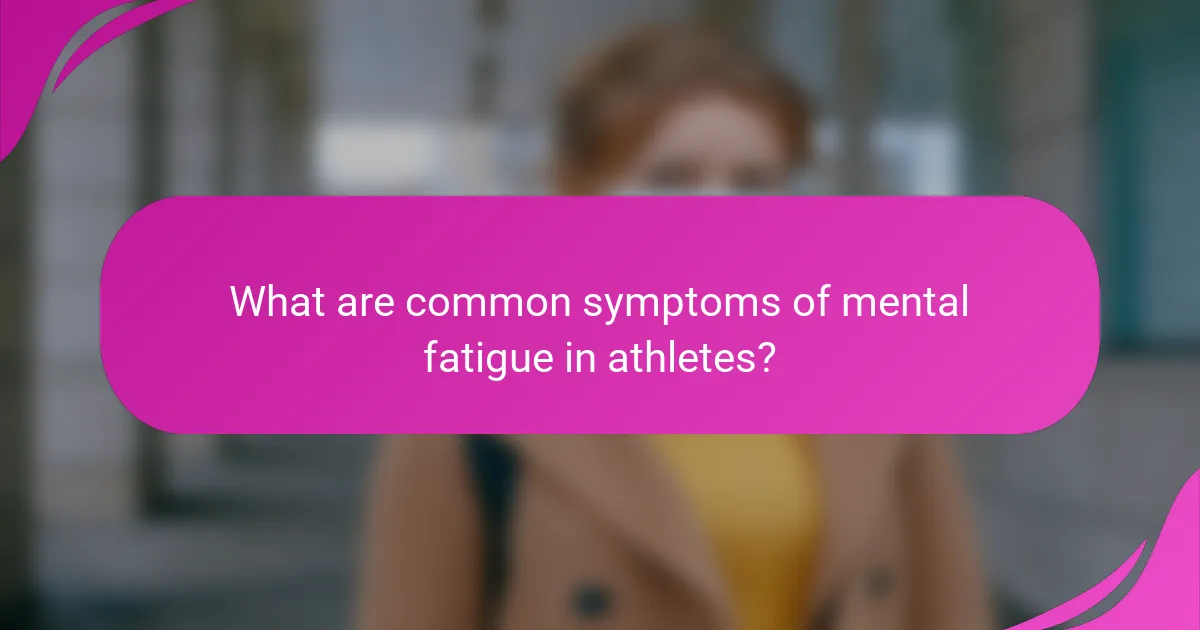Mental fatigue can significantly hinder athletic performance, leading to decreased focus and coordination. This article explores the effects of mental fatigue on athletes, highlighting performance decline, effective recovery strategies, and methods to build mental resilience. Understanding symptoms and implementing recovery techniques like mindfulness and structured rest are crucial for maintaining peak performance. Prioritising mental recovery is essential for athletes to combat fatigue and enhance their overall capabilities.

What are the effects of mental fatigue on athletic performance?
Mental fatigue significantly impairs athletic performance by reducing focus, coordination, and decision-making abilities. Athletes experiencing mental fatigue may show decreased endurance and increased perceived exertion. Strategies for recovery include adequate rest, mental breaks, and mindfulness practices. Building mental resilience through training can help athletes manage fatigue effectively.
How does mental fatigue manifest in athletes?
Mental fatigue manifests in athletes through decreased performance, impaired decision-making, and reduced motivation. Symptoms include difficulty concentrating, increased irritability, and a lack of energy. Research indicates that mental fatigue can lead to a performance decline of up to 20% in high-intensity sports. Recovery strategies such as adequate rest, mental breaks, and mindfulness practices can help restore mental resilience. Implementing these strategies is essential for maintaining peak performance levels and preventing burnout.
What are the physiological impacts of mental fatigue?
Mental fatigue significantly impairs athletic performance, leading to reduced endurance, slower reaction times, and decreased motivation. Studies show that mental fatigue can lower physical performance by up to 20%. Recovery strategies such as adequate sleep, hydration, and mental breaks are essential. Building mental resilience through mindfulness and cognitive training can help mitigate these effects.
How does mental fatigue influence decision-making and focus?
Mental fatigue significantly impairs decision-making and focus in athletes. It leads to slower reaction times, increased errors, and diminished cognitive flexibility. As a result, athletes may struggle to make quick, effective decisions during competition. Research indicates that prolonged mental fatigue can reduce attention span and hinder the ability to concentrate on tasks. Implementing recovery strategies, such as adequate rest and mental breaks, can help mitigate these effects and enhance mental resilience.

What are common symptoms of mental fatigue in athletes?
Common symptoms of mental fatigue in athletes include decreased motivation, impaired concentration, and increased irritability. Athletes may also experience slower reaction times and difficulty in decision-making. These symptoms can lead to a significant performance decline, affecting their overall athletic capabilities. Recognising these signs is crucial for implementing effective recovery strategies and fostering mental resilience.
How does mental fatigue affect motivation levels?
Mental fatigue significantly reduces motivation levels in athletes. This decline occurs because mental fatigue impairs cognitive functions, leading to decreased focus and energy. Athletes may struggle with decision-making and goal-setting, which are crucial for performance. Research indicates that prolonged mental strain can lower motivation by up to 30%, impacting training outcomes. Implementing recovery strategies, such as adequate rest and mental breaks, can help restore motivation and enhance mental resilience.
What role does sleep play in mental fatigue?
Sleep significantly reduces mental fatigue in athletes by enhancing cognitive function and recovery. Adequate sleep improves focus, decision-making, and reaction times, all crucial for optimal performance. Studies indicate that sleep deprivation can lead to a 20% decline in athletic performance. Furthermore, sleep aids in memory consolidation and emotional regulation, promoting mental resilience. Prioritising sleep can be a simple yet effective recovery strategy for athletes facing mental fatigue.

What strategies can athletes use for recovery from mental fatigue?
Athletes can use various strategies to recover from mental fatigue, including mindfulness practices, structured rest periods, and cognitive training. Mindfulness techniques, such as meditation, enhance focus and reduce stress. Structured rest periods allow the brain to recover, improving overall performance. Cognitive training exercises can sharpen mental resilience, enabling athletes to better handle future stressors.
What are effective mental recovery techniques?
Effective mental recovery techniques include mindfulness, visualization, and structured rest periods. Mindfulness helps athletes focus on the present, reducing stress and anxiety. Visualization techniques enhance performance by mentally rehearsing successful outcomes. Structured rest periods, including breaks and sleep, are essential for cognitive recovery and performance maintenance. Incorporating these strategies fosters mental resilience and combats performance decline due to mental fatigue.
How can mindfulness practices aid in recovery?
Mindfulness practices significantly aid recovery by enhancing mental resilience and reducing mental fatigue in athletes. These techniques promote relaxation and focus, which can counteract performance decline caused by stress. Studies show that athletes who engage in mindfulness report improved concentration and emotional regulation, leading to better recovery outcomes. Techniques such as meditation and breathing exercises can lower cortisol levels, fostering a more conducive environment for mental and physical recovery.
What role does nutrition play in mental recovery?
Nutrition significantly aids mental recovery by providing essential nutrients that support cognitive function and mood regulation. Adequate intake of vitamins, minerals, and omega-3 fatty acids enhances brain health, reduces fatigue, and improves overall mental resilience. Athletes benefit from a balanced diet that includes antioxidants, which combat oxidative stress, and carbohydrates, which replenish energy levels. For example, studies show that hydration and proper nutrition can lead to improved focus and quicker recovery times. Prioritising nutrition is a key strategy for athletes to combat mental fatigue and enhance performance.
How important is rest and downtime for mental recovery?
Rest and downtime are crucial for mental recovery in athletes. Adequate rest mitigates mental fatigue, enhances focus, and improves performance. Studies show that athletes who incorporate regular rest periods experience a significant reduction in stress levels and cognitive overload. This leads to better decision-making during competitions. Additionally, mental resilience is fortified through structured downtime, allowing athletes to recharge and return to training with renewed energy. Prioritising rest not only aids recovery but also sustains long-term athletic performance.

What unique approaches can enhance mental resilience in athletes?
Unique approaches to enhance mental resilience in athletes include mindfulness training, cognitive restructuring, and visualization techniques. Mindfulness training helps athletes focus on the present, reducing anxiety and enhancing performance. Cognitive restructuring involves identifying and challenging negative thoughts, fostering a positive mindset. Visualization techniques allow athletes to mentally rehearse successful performances, building confidence and resilience. These strategies collectively promote recovery from mental fatigue, improving overall athletic performance.
How can goal-setting improve mental resilience?
Goal-setting enhances mental resilience by providing clear objectives and a sense of purpose. It allows athletes to focus their energy and maintain motivation during challenging times. Research shows that setting specific, measurable goals can reduce mental fatigue and improve performance outcomes. As a result, athletes experience greater recovery and adaptability in high-pressure situations.
What are the benefits of mental conditioning programs?
Mental conditioning programs enhance athletes’ performance by improving mental resilience, reducing mental fatigue, and accelerating recovery. These programs teach techniques like visualization and self-talk, which help athletes manage stress and maintain focus. Research indicates that mental conditioning can lead to a 10-20% improvement in performance metrics. Furthermore, athletes who engage in these programs report higher levels of motivation and confidence, contributing to overall success in their sports.

What are some rare but effective methods for combating mental fatigue?
Engaging in mindfulness meditation, utilising power naps, and practicing breath control are rare but effective methods for combating mental fatigue in athletes. Mindfulness meditation enhances focus and reduces stress, leading to improved performance. Power naps of 20 minutes can restore energy and cognitive function. Breath control techniques, such as deep diaphragmatic breathing, can lower anxiety and enhance mental clarity, crucial for maintaining resilience during intense training and competition.
How can technology assist in monitoring mental fatigue?
Technology can significantly assist in monitoring mental fatigue through various innovative tools. Wearable devices, such as fitness trackers, provide real-time data on physiological indicators like heart rate variability and sleep patterns, which correlate with mental fatigue levels. Mobile applications can facilitate self-assessment by allowing athletes to log their mood, energy levels, and stress, offering insights into their mental state. Additionally, biofeedback systems can train athletes to recognize and manage their mental fatigue effectively. These technologies enhance awareness, enabling timely interventions to improve performance and recovery strategies.
What unconventional therapies have shown promise in recovery?
Unconventional therapies like mindfulness meditation, art therapy, and neurofeedback have shown promise in aiding recovery from mental fatigue in athletes. These approaches enhance mental resilience and improve performance. Mindfulness meditation reduces stress and fosters focus, while art therapy encourages emotional expression, aiding recovery. Neurofeedback trains brain activity, promoting cognitive function and emotional regulation.

What best practices should athletes follow to optimize mental performance?
Athletes should prioritise mental recovery strategies to mitigate mental fatigue and enhance performance. Effective practices include regular mental breaks, mindfulness training, and maintaining a balanced routine. These strategies help in reducing stress and improving focus, ultimately fostering mental resilience. Regular sleep patterns and proper nutrition also play crucial roles in mental recovery, supporting sustained performance.
What common mistakes do athletes make regarding mental fatigue?
Athletes often underestimate mental fatigue, leading to performance decline. Common mistakes include neglecting recovery strategies, failing to recognise signs of fatigue, and not prioritising mental resilience training. These oversights can hinder performance and prolong recovery. Addressing mental fatigue proactively enhances overall athletic performance.
How can athletes create a personalized mental recovery plan?
Athletes can create a personalised mental recovery plan by assessing their individual mental fatigue levels and incorporating specific strategies. They should identify their unique stressors and recovery needs, and set realistic goals. Techniques such as mindfulness, visualization, and structured downtime can enhance mental resilience. Regularly evaluating the effectiveness of these strategies ensures continued progress and adaptation.
What expert insights can guide athletes in managing mental fatigue?
Athletes can manage mental fatigue by implementing structured recovery strategies and enhancing mental resilience. Techniques like mindfulness, adequate sleep, and balanced nutrition are essential. Research indicates that mental fatigue can lead to a significant performance decline, emphasizing the need for effective management. Incorporating mental training exercises can also boost resilience, enabling athletes to better cope with stressors and maintain focus during competitions.